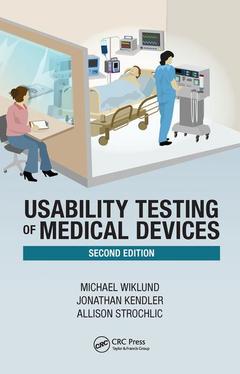Usability Testing of Medical Devices (2nd Ed.)
Auteurs : Wiklund P.E. Michael E., Kendler Jonathan, Strochlic Allison Y.

Usability Testing of Medical Devices covers the nitty-gritty of usability test planning, conducting, and results reporting. The book also discusses the government regulations and industry standards that motivate many medical device manufacturers to conduct usability tests.
Since publication of the first edition, the FDA and other regulatory groups have modified their regulations and expectations regarding how medical device manufacturers should approach usability testing. Reflecting these changes, this Second Edition provides updated guidance to readers with an interest or direct role in conducting a usability test of a medical device or system. Key updates involve the 2011 FDA guidance on human factors engineering, requirements set forth by the third edition of IEC 60601 and closely related IEC 62366-1:2015, linking usability test tasks to risk analysis results, and analyzing root causes of use errors that occur during usability tests.
Written by seasoned human factors specialists, Usability Testing of Medical Devices, Second Edition is an informative, practical, and up-to-date handbook for conducting usability tests of medical devices. The book helps ensure a smooth and painless development process?and thus, safe and effective medical devices.
Introduction. Risk management and usability testing. The commercial imperative. Testing costs. Anatomy of a usability test. Types of tests. Writing a test plan. Choosing a participant sample and recruiting participants. Test environments. Adding realism. Selecting tasks. Conducting the test. Interacting with participants. Documenting the test. Analyzing test data. Reporting results. Validation testing.
Michael E. Wiklund is general manager of the human factors engineering (HFE) practice at UL-Wiklund, as well as professor of the practice at Tufts University, where he teaches courses on HFE. He has more than 30 years of experience in HFE, much of which has focused on medical technology development. His work has involved optimizing the safety, effectiveness, usability, and appeal of various products. Widely published, he is a certified human factors professional and one of the primary contributors to today’s most pertinent guidelines on the HFE of medical devices: AAMI HE75 and IEC 62366.
Jonathan Kendler is design director of UL-Wiklund’s human factors engineering (HFE) team. He has worked in the HFE profession since receiving his bachelor of fine arts degree in visual design from the School of the Museum of Fine Arts, Boston. He earned his master’s degree in human factors in information design from now Bentley University. His design portfolio ranges from small, handheld medical devices to room-size diagnostic scanners. In addition, he has co-taught applied software user interface design at Tufts University, and delivered HFE workshops to medical and nonmedical clients.
Allison Y. Strochlic is research director of UL-Wiklund’s human factors engineering (HFE) team. She earned her bachelor of science degree in HFE from Tufts University, and her master’s degree in human factors in information design from Bentley University. A board-certified human factors professional, she is a member of the Human Factors and Ergonomics Society New England Chapter, User Experience Professionals Association, and Association for the Advancement of Medical Instrumentation Home Use Environment Committee. She has served as a part-time lecturer at Tufts University, and delivered multiple presentations to industry and academic audiences.
Date de parution : 02-2016
15.6x23.4 cm
Thèmes d’Usability Testing of Medical Devices :
Mots-clés :
Summative Usability Test; Usability Test; summative; Test Participants; participant; Formative Usability Test; formative; Medical Device; sessions; Test Sessions; user; Usability Test Session; interface; Usability Test Participant; design; Usability Test Plan; plans; Summative Usability; administrator; Usability Test Report; glucose; Usability Test Specialist; Quick Reference Card; Test Administrator; Medical Device Manufacturers; Conduct Usability Tests; Distinct User Group; Institutional Review Board; IRB; Ide; Average Task Times; Interface Design Flaw; Design History File; IRB Process; Risk Control Measures



